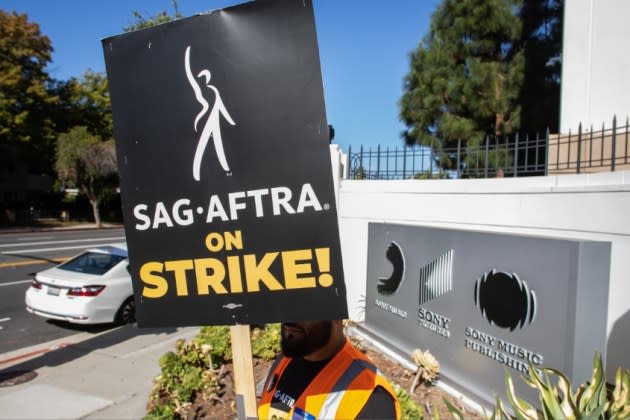How Hollywood’s Double Strike Is Still Reverberating Across the Pond: Scheduling Chaos, Less Content and More Willingness to Strike

It’s been three months since Hollywood’s dual strikes finally ended, with SAG-AFTRA reaching a deal some six weeks after their WGA counterparts, but the reverberations are continuing across the pond.
As producer John McVey told a Parliamentary inquiry into the state of the U.K.’s screen industry last month: “If America sneezes, we often catch a cold when it comes to things like strikes.”
More from Variety
L.A. Production Slow to Rebound After WGA and SAG-AFTRA Strikes
Network TV Pilot Season Is Mostly Dead - but Stubbornly Hasn't Gone Away Completely
Nowhere was that more clear than in the British Film Institute’s annual report, unveiled last week. It revealed that spending on film and high-end television production in the U.K. had dropped by an unprecedented 35% in 2023, largely due to the U.S. strikes. Among the films that were forced to delay production were Universal’s live-action adaptation of “How To Train Your Dragon” and Plan B’s “Hedda.”
Unlike the post-COVID boom, which saw a glut of projects spring back into production as soon as restrictions were lifted, there hasn’t been the same momentum following the conclusion of the strikes. “Things haven’t come flooding back as yet,” agrees Lee Stone, a partner at London-based entertainment law firm Lee & Thompson. The dust hasn’t settled enough yet to be able to say whether that’s because it’s “still too soon” or because of a variety of other factors such as inflationary pressures, AI, new terms with U.K. crew union Bectu or simply because studios have had time to change their minds about projects.
Either way, the dearth of production will have knock-on effects. “There’s going to be a lack of content and things to distribute because there was that time lag of eight or nine months,” Stone says.
Cinemas, who are already struggling, may once again have trouble filling screens, as they did during COVID. During the Parliamentary inquiry in January, CEO of the U.K. Cinema Association Phil Clapp told Members of Parliament that the strikes had delayed post-pandemic recovery of the global sector by around a year. The BFI’s recent report showed that while U.K. box office was marginally up in 2023 (by 4%), it still lagged behind 2019’s total results by a whopping 24%. “The strike was twice as bad as the pandemic. It was pointless and will take two years to recover,” one senior studio exec grumbled to Variety.
For streamers and broadcasters, who are battling subscriber churn and plummeting viewing figures respectively, a lack of new content also poses a significant threat and some are now squeezing post-production schedules to try and make-up for it. “The pressure to deliver is intense, because the broadcasters don’t have material to TX and are desperate for it,” one producer told Variety.
It’s something the producer, who spoke on condition of anonymity, has experienced first-hand, having worked on a big-budget limited drama with an A-list star that was just a week away from wrapping last year when the strikes shut down production for six months. When the show finally went into post-production, the commissioning streamer demanded that it be delivered three months early. As the producer pointed out, it’s a decision that will have a knock-on effect on budgets, marketing, working hours and potentially quality.
Now, to add to the turbulence, more strikes are on the horizon. In the U.S., Teamsters and IATSE are renegotiating their contracts starting this spring and shots have already been fired across the bow. “We will fight aggressively at the table to achieve a contract that reflects our members’ priorities and their invaluable contributions to the success of the entertainment industry,” a spokesperson for IATSE told Variety in December.
Johannes Studinger, head of media and entertainment at Switzerland-based international union federation UNI Global (which counts IATSE amongst its members), says IATSE and Teamsters strikes could well affect international productions, with heads of department and key crew members such as DOPs potentially stopping work. “But let’s hope it doesn’t come to that,” Studinger says.
SAG-AFTRA and WGA members could also down tools in solidarity. One of the crucial factors in last year’s strikes, Studinger points out, was that studios and streamers “completely underestimated” both the willingness to strike and the solidarity among entertainment unions. With crews having been particularly burned by the actors and writers strikes (after all, few of them have residuals to fall back on), there will no doubt be an expectation of support in return.
Due to local trade union laws, Bectu members would not be able to strike. But the British union is fighting its own battles, having recently issued additional guidance on drama rates alongside producers union Pact, a follow-up to an agreement that was signed at the end of 2022 following months of tense negotiations. Meanwhile, English National Opera members – who are also part of U.K. performers union Equity — were on the verge of industrial action after job cuts were announced. The strike was only called off last week after they reached a last-minute interim agreement.
In France, some TV crews have been striking intermittently since the beginning of the year and, according to Studinger, German crew and actors unions are currently in the middle of negotiating new collective agreements. Studinger, who has been in his position since 2009, says there has been a renewed commitment to collective bargaining agreements – and striking if necessary – in recent years.
“There’s a new generation of workers who are willing to stand up for better working conditions, shorter and better working time arrangements,” he says. “And I think that’s a significant change from even five years ago.”
Best of Variety
Sign up for Variety’s Newsletter. For the latest news, follow us on Facebook, Twitter, and Instagram.

 Yahoo News
Yahoo News 